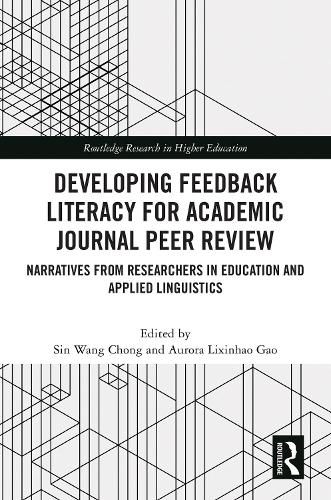Readings Newsletter
Become a Readings Member to make your shopping experience even easier.
Sign in or sign up for free!
You’re not far away from qualifying for FREE standard shipping within Australia
You’ve qualified for FREE standard shipping within Australia
The cart is loading…






This edited volume showcases first-hand accounts of crafting and handling feedback during the peer review process from early career researchers (ECRs), journal editors and experienced reviewers to develop the concept of 'feedback literacy' in academic peer review contexts.
This novel collection of research uses personal reflections, disseminations of good practices, research syntheses and small-scale primary studies to highlight implications for feedback practices, demonstrating how academics' capacity, disposition and skills in providing and engaging with constructive, professional and actionable feedback are crucial to ensure a comprehensive and worthwhile process. Chapters draw attention to the need for academics to develop feedback literacy, both at the ECR level and for more experienced peer reviewers, journal editors and authors, furthering discussion on improvement strategies and solutions to current feedback practices.
Reimagining journal peer review as an inclusive and sustainable participatory system, this book will appeal to scholars and researchers working in higher education and educational assessment. There will be particular interest among postgraduate students and ECRs across the Arts, Humanities and Social Sciences disciplines for whom journal peer review has a particular relevance.
$9.00 standard shipping within Australia
FREE standard shipping within Australia for orders over $100.00
Express & International shipping calculated at checkout
This edited volume showcases first-hand accounts of crafting and handling feedback during the peer review process from early career researchers (ECRs), journal editors and experienced reviewers to develop the concept of 'feedback literacy' in academic peer review contexts.
This novel collection of research uses personal reflections, disseminations of good practices, research syntheses and small-scale primary studies to highlight implications for feedback practices, demonstrating how academics' capacity, disposition and skills in providing and engaging with constructive, professional and actionable feedback are crucial to ensure a comprehensive and worthwhile process. Chapters draw attention to the need for academics to develop feedback literacy, both at the ECR level and for more experienced peer reviewers, journal editors and authors, furthering discussion on improvement strategies and solutions to current feedback practices.
Reimagining journal peer review as an inclusive and sustainable participatory system, this book will appeal to scholars and researchers working in higher education and educational assessment. There will be particular interest among postgraduate students and ECRs across the Arts, Humanities and Social Sciences disciplines for whom journal peer review has a particular relevance.